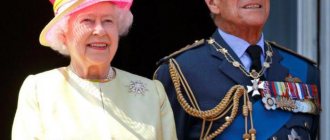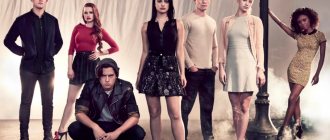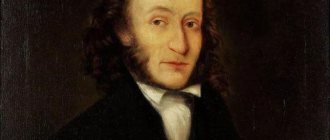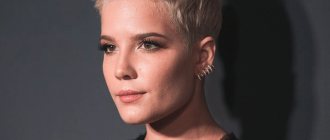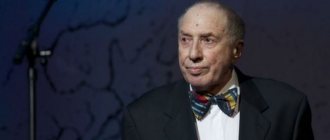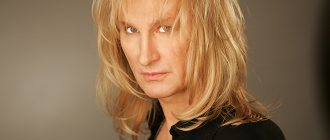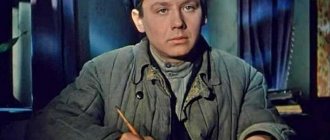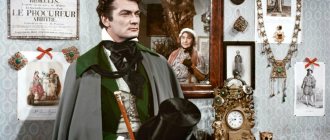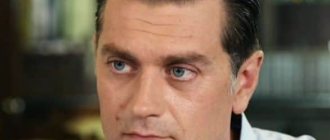Dossier
Charles, Prince of Wales (full name Charles (Charles) Philip Arthur George (George) Windsor ) was born in London on November 14, 1948.
In 1952, following the death of George VI and his mother's accession to the throne, at the age of three, Charles became heir to the British throne and received the titles Duke of Cornwall, Duke of Rothesay and Earl of Carrick. In 1958 he also received the titles of Prince of Wales and Earl of Chester.
Prince Charles and Princess Anne, 1951. Photo: www.globallookpress.com
Second wife: Camilla Parker Bowles
According to rumors, Charles, Prince of Wales, and Camilla maintained a relationship even before the heir met Princess Diana. But then his mother did not allow him to marry a girl of dubious reputation. Even before her wedding to Officer Parker, she was in relationships with other men, which in those days was unacceptable for a woman who would later become queen.
It was the relationship between Charles and Camilla that caused the dissolution of his marriage to Princess Diana. The couple got married only in 2005. For the first time in the history of the English monarchy, a wedding was held according to a civil order. After the wedding, Camilla became Princess of Wales and Duchess of Cornwall. However, out of respect for the deceased Diana, she tries not to mention the title of princess in public.
Education
He studied at the prestigious private schools Hill House and Cheam School, and in high school he studied at the Gordonstown boarding school.
In 1966, he spent two terms at Geelong Grammar School in Victoria, Australia. That same year, he was an exchange student at Timbertop, a remote outpost of Gilon, and at a Church of England grammar school in Melbourne, Australia.
In 1970 he graduated from Trinity College, Cambridge University, where he studied archaeology, anthropology and history. In addition, in 1969 he studied Welsh for a semester at the University of Wales in Aberystwyth.
Prince Charles, 1974. Photo: Creative commons/ Allan warren
Military service
In 1971-1976 he was in military service: he completed training as a fighter and military helicopter pilot, and also served on ships of the British Navy.
In 1976, he completed his service as commander of the Coast Guard minesweeper Bronington.
In January 1977, he was promoted to the rank of commander. Subsequently, he received promotions several times.
In 2002, Prince Charles became a Vice Admiral of the Royal Navy, an Air Marshal of the Royal Air Force (RAF) and a Lieutenant General of the Army. In 2006, he was promoted to admiral in the Royal Navy, becoming a general of the army and an air chief marshal of the Royal Air Force.
Since 16 June 2012, the Prince of Wales has been Admiral of the Fleet, Field Marshal, and Marshal of the Royal Air Force.
In the 1970s, he participated in meetings of the House of Lords, and also became the first member of the royal family in three hundred years to attend a meeting of the Cabinet of Ministers.
Prince Charles's further career, education and work
It is quite remarkable that the Master of Arts degree in the case of Prince Charles turned out to be far from just a formality.
Over the years, he successfully demonstrated himself as a skilled writer. At the moment, he is the author of many books devoted to painting, architecture, gardening and ecology. In addition, at a certain period, the Prince of Wales decided to try himself as a screenwriter and wrote scripts for some little-known documentaries. However, in fairness, it should be noted that literature has always been just a favorite hobby for Prince Charles. He never aspired to a career as a professional writer or screenwriter, devoting himself entirely to public service and the daily duties of the heir to the throne.
Biography of Prince Charles In the seventies, he took part in meetings of the House of Lords several times and was even present during a meeting in the Cabinet of Ministers. It is quite remarkable that Prince Charles is the first monarch in more than three hundred years to be allowed to participate in the work of British ministers. According to some reports, for a long time the name of the Prince of Wales appeared on the list of contenders for the post of Governor-General of Australia, but due to the constitutional crisis on the Green Continent, our today's hero abandoned his claims to this position.
After working in the public service, the heir to the royal throne began military service. In 1971, he completed training and was officially commissioned into the British Air Force as a helicopter and fighter pilot. The Prince of Wales served in this capacity for several years, after which he voluntarily transferred to the navy, to which he gave a couple more years of his life.
After returning to London, Charles began to actively engage in charity work. There are currently more than 350 different structures under his patronage. In addition, our today's hero is the founder of the Prince Foundation, as well as fifteen other organizations working in the field of environmental conservation and improvement of the urban environment. Among other things, the Prince of Wales is also actively interested in alternative medicine, and also supports various liberal projects aimed at recognizing the rights of sexual minorities and small nations.
Prince Charles in the metro When talking about the functions of the prince, it is worth noting the fact that in recent years, due to the advanced age of his parents, it is he who makes most of the interstate visits. As a representative of the British monarchy, he receives ambassadors of other states, and also often personally visits foreign countries.
Charity
He is actively involved in charity work and is a member of various societies and foundations. Active defender of nature and natural resources. He leads an international campaign for the conservation of tropical forests, promotes sensible consumption and an eco-friendly lifestyle, and owns a company producing high-quality organic products under the Duchy Originals brand.
In 2011, Prince Charles became President of the World Wildlife Fund-UK (WWF-UK).
Elizabeth II: from coronation to the present day
Coronation of Elizabeth II. Commons.wikimedia.org
After her coronation in 1953-1954, the Queen made a six-month tour of the Commonwealth states, British colonies and other countries around the world. Elizabeth II became the first monarch to visit Australia and New Zealand. She continued her travels in 1961, when she made visits to Cyprus, the Vatican, India, Pakistan, Nepal, Iran and Ghana. Commons.wikimedia.org
In 1960, the Queen gave birth to her second son, Prince Andrew, and in 1964, her third son, Prince Edward. www.globallookpress.com
Visit to Germany, 1965. www.globallookpress.com
1977 was an important year for the Queen - the 25th anniversary of Elizabeth II's tenure on the British throne was celebrated, in honor of which many ceremonial enterprises were held in the Commonwealth countries. That same year, the Queen visited Washington. Commons.wikimedia.org
Elizabeth II on a walk near Windsor Castle with Ronald Reagan, 1982. Commons.wikimedia.org
In 1981, there was an unsuccessful attempt on Elizabeth II's life during a military parade in honor of the Queen's birthday. www.globallookpress.com
1992 was a “terrible year,” according to Elizabeth herself. Two of the Queen's four children - Prince Andrew and Princess Anne - divorced their spouses, Prince Charles separated from Princess Diana, Windsor Castle was badly damaged by fire, the Queen was charged with paying income tax, and funding for the royal household was noticeably reduced. In the photo: with Prince Andrew. www.globallookpress.com
Russian President Boris Yeltsin, British Queen Elizabeth II and Moscow Mayor Yuri Luzhkov on Red Square during the Queen's official visit to Russia, 1994. RIA Novosti / Dmitry Donskoy
In 2002, ceremonial events were held in honor of the 50th anniversary of Elizabeth II on the British throne (golden jubilee). The same year, the Queen's sister Princess Margaret and the Queen Mother, Queen Elizabeth, died. Commons.wikimedia.org/Michael Pead
The Queen and Prince Philip at the wedding of Prince William and Kate Middleton, 2011. Commons.wikimedia.org/Robbie Dale
Queen Elizabeth II, 2020. www.globallookpress.com
Elizabeth II, May 2020. www.globallookpress.com
Royal duties
Like every member of the royal family, Charles has always had a very busy schedule.
At the age of ten, he received the title of Prince of Wales, and the dedication ceremony took place on the day he turned 21.
After this, the son of Elizabeth II began to actively engage in social activities. Despite his young age, even then the prince could often be seen at meetings of the British Parliament.
For many years now, the Prince of Wales's work schedule has remained very busy. Charitable activities occupy an important place in the life of the heir to the throne. Charles independently founded many organizations and takes an active part in their work. In the first place for him is the issue of limiting the influence of human activity on nature.
Elizabeth II: from coronation to the present day
Coronation of Elizabeth II. Commons.wikimedia.org
After her coronation in 1953-1954, the Queen made a six-month tour of the Commonwealth states, British colonies and other countries around the world. Elizabeth II became the first monarch to visit Australia and New Zealand. She continued her travels in 1961, when she made visits to Cyprus, the Vatican, India, Pakistan, Nepal, Iran and Ghana. Commons.wikimedia.org
In 1960, the Queen gave birth to her second son, Prince Andrew, and in 1964, her third son, Prince Edward. www.globallookpress.com
Visit to Germany, 1965. www.globallookpress.com
1977 was an important year for the Queen - the 25th anniversary of Elizabeth II's tenure on the British throne was celebrated, in honor of which many ceremonial enterprises were held in the Commonwealth countries. That same year, the Queen visited Washington. Commons.wikimedia.org
Elizabeth II on a walk near Windsor Castle with Ronald Reagan, 1982. Commons.wikimedia.org
In 1981, there was an unsuccessful attempt on Elizabeth II's life during a military parade in honor of the Queen's birthday. www.globallookpress.com
1992 was a “terrible year,” according to Elizabeth herself. Two of the Queen's four children - Prince Andrew and Princess Anne - divorced their spouses, Prince Charles separated from Princess Diana, Windsor Castle was badly damaged by fire, the Queen was charged with paying income tax, and funding for the royal household was noticeably reduced. In the photo: with Prince Andrew. www.globallookpress.com
Russian President Boris Yeltsin, British Queen Elizabeth II and Moscow Mayor Yuri Luzhkov on Red Square during the Queen's official visit to Russia, 1994. RIA Novosti / Dmitry Donskoy
In 2002, ceremonial events were held in honor of the 50th anniversary of Elizabeth II on the British throne (golden jubilee). The same year, the Queen's sister Princess Margaret and the Queen Mother, Queen Elizabeth, died. Commons.wikimedia.org/Michael Pead
The Queen and Prince Philip at the wedding of Prince William and Kate Middleton, 2011. Commons.wikimedia.org/Robbie Dale
Queen Elizabeth II, 2020. www.globallookpress.com
Elizabeth II, May 2020. www.globallookpress.com
Family status
Was married twice. In 1981 he married Lady Diana Spencer . The couple had two sons: June 21, 1982 - Prince William , September 15, 1984 - Prince Henry , better known as Prince Harry .
In 1992, the separation of Charles and Diana was officially announced, and in 1996 their marriage was officially dissolved. In 1997, Princess Diana died in a car accident in Paris.
In 2005, Prince Charles married for the second time. His wife was Camilla Parker Bowles .
Their marriage took place in a civil ceremony, with Camilla receiving the title of Duchess of Cornwall. Prince Charles and Camilla, Duchess of Cornwall, 2020. Photo: www.globallookpress.com/ Cpna Rota
Now Prince Charles, the king-in-waiting, is in fact the man pulling the strings to protect the crown.
The 71-year-old heir to the throne flew back to Britain yesterday after a successful trip to New Zealand and began to take control of the royal family at this turning point.
His key role in Andrew's brutal exile is the latest indication of the process of power transfer from mother to son - from Charles as Prince of Wales to king and head of "the firm" - and this process has been going on for some time.
Today the Queen is 93 years old, and although sources say terms like "regime change" and "regency" are officially taboo, there is an acknowledgment that she cannot continue to reign forever.
Her Majesty will be 95 in 18 months - the age at which Prince Philip retired from public life - and there has been renewed talk outside the royal palace that she will almost be "retiring" at that point.
Daily Express 11/29/2019 Foreign Media 10/21/2019
Charles took her place at the Monument to the Unknown Soldier on Remembrance Sunday and will also attend the Commonwealth Heads of Government meeting in Rwanda next year.
Gradually, although still maintaining hands-on management of affairs in general, the Queen has reduced her participation in formal affairs and now spends more time at Windsor Castle and reduces the number of her public duties.
In 2020, she took part in 283 events, which is 332 events less than in 2020, while Charles participated in 507 events of this kind. Charles gradually steps into this role, like a king in all but name.
Here's what a well-placed royal source says: “Planning for Charles to become king has been underway for some time. This transition is clearly already underway. Her Majesty is over 90 years old and, for obvious reasons, nothing can be done about it.”
"Opportunity to ascend the throne"
“The scandal surrounding Andrew and Epstein provided an opportunity for Charles to step in and show that he is capable of running The Firm. There is nothing bigger than the institution of the Royal Family. And this applies even to Andrew, the Queen's favorite son."
“Charles understood this and acted decisively - like the king he may soon become. This was the moment when Charles stepped up as Prince Regent, as the shadow king.”
Charles wants to use his new influence to create a lighter version of the monarchy, and this is bad news for Andrew, as well as his daughters Beatrice and Eugenie.
However, it is clear that there are concerns over Harry and Meghan's future role, and Charles is actively consulting with William about the future direction of the monarchy.
“Charles had discussions with William. They both know what he wants to do with the kingship. There is no doubt that Charles will also be pushing Prince Harry and Meghan to get a place in line once they finish their privacy break,” the source added.
Those close to the court say Charles's decisive role in the Andrew saga began when he began to take control.
Despite being a thousand miles away in New Zealand, Prince Charles immediately realized the damage that day after day of press headlines about his brother and American billionaire's pedophilia obsession would cause.
However, at a time when Buckingham Palace was wavering and the Queen was under great pressure due to the absence of Prince Philip by her side, Charles began to act. When Charles and Camilla arrived in Auckland, Prince Andrew's now-infamous interview had not yet been shown on television.
However, the Sunday newspapers had already published a full account of this sensational broadcast, and Charles and his team members began to watch in horror the consequences of the growing fire.
According to sources, Charles did not watch the interview himself, relying on his personal secretary Clive Alderton to give his damning assessment.
Andrew and his wonderful private secretary Amanda Thirsk hoped the Newsnight interview would help defuse the criticism.
When they learned that Virginia Roberts Giuffre - who claims she was forced to have sex at age 17 and that photographs of them together had been published - was interviewed on the BBC's Panorama programme. Si, they panicked.
Negotiations between the Duke of York's camp and Newsnight were urgently started, and Princess Beatrice began to help her father. Andrew tried to come forward to explain why he visited Epstein in 2010, two years after he was accused of having sex with a child, and said he "knew nothing" about the meeting with Roberts.
The Washington Post 09/10/2015
Questions have now been raised about the Queen's decision to allow him to do this interview. Is she too old at 93 to lead a country if she can't even control her family? Perhaps the reason is her traditional preferential treatment of her second son?
Was she weakened by the farce of Boris Johnson's prorogation of Parliament and weak courtiers, and lost control as a result? Charles was horrified by this devastating blow to the monarchy and decided to speak via a special secure telephone line to his mother.
In a scene that could have been lifted from Netflix's The Crown, Charles told her in a low voice: “Andrew has to go. This is the only way out." According to many reports, the Queen was calm - she agreed.
The House of Windsor acts ruthlessly when its own future is threatened. After Edward VIII was forced to abdicate, no member of the Royal Family resigned.
Sources close to Charles said he himself had not spoken directly to his brother, but nevertheless made it clear to Buckingham Palace officials that he and the Queen agreed that "this needs to be done."
However, Andrew refused to resign. He didn't want to lose all the pomp and privilege that came with being a royal, including the £250,000 he received for his role.
"Andrew Must Go"
Even as late as Tuesday night, he was still desperately holding on, even as patrons and supporters began to turn their backs on him. “His departure from office” was intended to be permanent, but Andrew wanted to maintain a path back to royal life if he was acquitted and the FBI cleared him of all charges.
“Despite all the headlines, Charles was sympathetic to his brother. "He believed he was telling the truth and thought his brother was a 'terrible fool' but that all people deserve redemption," said one royal source.
William supported his father's actions, while Harry and Meghan - who suffered the consequences of the terrible interview themselves - were "simply horrified".
Meanwhile, Charles and Camilla gave no hint of a row as they smiled and waved for the cameras in Auckland, but phone lines remained red-hot between New Zealand and the United Kingdom throughout the night.
Clive Alderton even flew home before the end of the tour to work with Edward Young, the Queen's private secretary, and William's private secretary Simon Case, hoping that Andrew would resign.
A compromise was reached on Wednesday. Andrew will be gone for the "foreseeable future" and the Queen will strike on her 72nd wedding anniversary before presenting the award to Sir David Attenborough the same evening.
Andrew agreed to “step back” from around 200 trusteeship and charity projects. He found himself out in the cold, and will continue to be so until the public mood changes or until the FBI is satisfied about his possible connections to Epstein's horrific crimes.
And today, Action on Hearing Loss was the latest event to confirm that the Duke of York will step down as trustee of the project "with immediate effect."
Although he was seen riding horseback with the Queen, Andrew will no longer perform any public duties until Beatrice's engagement, scheduled for next spring. Perhaps he will never return. Charles is currently in the United Kingdom following his visit to India, New Zealand and the Solomon Islands.
Contrary to reports that he was ready for "a showdown with his brother", he headed straight to Sandringham to meet representatives of organic farming.
“As for Charles, he is minding his own business now, or at least will be for the foreseeable future. There are currently no plans for him to meet with his brother to discuss the situation further. This issue is closed,” said one of the court sources.
The arrogant Andrew remains under siege and is amazed at the speed of his dismissal. In a very difficult way, he learned a lesson, the meaning of which is that no one can be above the institution of the court. The monarchy - and today it's Charles - rules, okay.
InoSMI materials contain assessments exclusively of foreign media and do not reflect the position of the InoSMI editorial staff.
